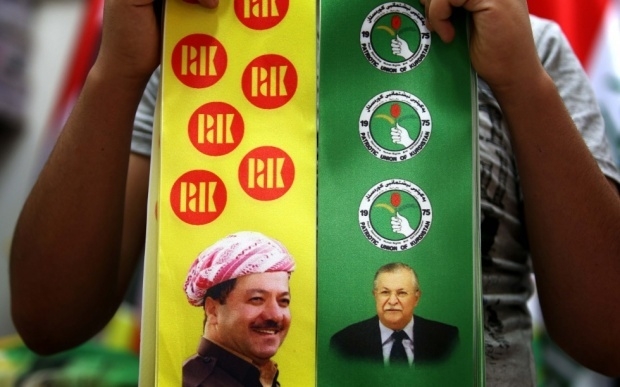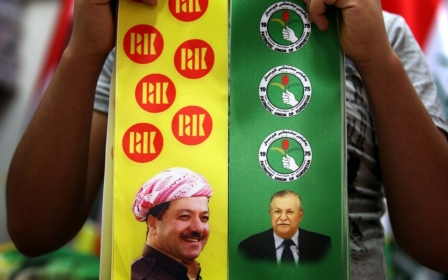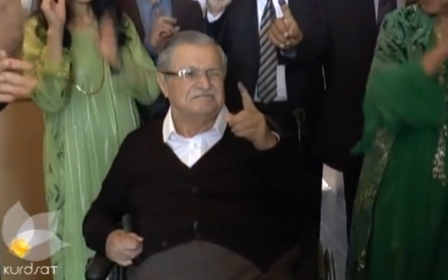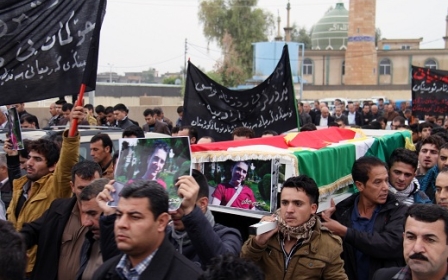Iraqi Kurds skeptical of change despite poll gains

ERBIL, Iraq - Under different circumstances, preliminary Iraqi elections results pointing to a relatively strong performance by Kurds would have been a cause of much joy and celebration among the minority.
Iraq’s electoral commission announced on Monday that five Kurdish parties had won a total of 62 seats in the 328-member parliament - five more than the previous elections in 2010.
Kurds especially did well in the oil-rich disputed province of Kirkuk, where they won eight of 12 seats overtaking Arab and Turkmen groups there.
But deepening internal divisions among Kurds, coupled with a serious standoff with the federal authorities in Baghdad, has dulled enthusiasm towards the results.
Botan Sleman owns a traditional book store near the millennia-old citadel in downtown Erbil.
Echoing the sentiments of many here, he expresses dismay at the likelihood of positive change in Iraq. He is similarly upset about the current state of division among Kurds.
“The important thing is Kurds should be united in Baghdad otherwise without unity we cannot gain anything. I do hope they will unite in Baghdad,” says Sleman while seating behind an old desk in his small shop crammed to the roof with books.
Unity or no unity?
Historically, unity has not been a strong feature of Kurdish politics.
Division and occasional internal fighting, in contrast, have been a defining trait of Kurdish political life.
But for much of the decade following the US-led invasion of Iraq in 2003, Kurds were noted for their relative cohesion in an otherwise deeply-fractured political scene in Iraq.
The unity brought them recognition of key political and cultural rights, strong representation in Baghdad and rising prosperity at home.
The two traditionally dominant groups of the Kurdistan Democratic Party (KDP), led by Kurdistan Region’s President Masoud Barzani, and the Patriotic Union of Kurdistan (PUK), led by the ailing outgoing Iraqi President Jalal Talabani, formed the bedrock of that unity for the past decade.
But a steady chain of events over the past few years has introduced deepening fissures into the Kurdish ranks.
The first major incident was the emergence of a new political movement called Gorran, Kurdish for change.
As a splinter group from the PUK, it ate away at the base of Talabani’s party and won the trust of many independent and critical Kurds as well.
Soon Gorran and a couple of smaller Islamist parties formed a strong opposition in Kurdistan. At times, it stood firmly against some of the plans and practices of the KDP-PUK coalition both in Kurdistan and Baghdad.
For the first time since the toppling of Saddam Hussein’s regime in 2003, growing rivalries in Kurdistan prompted different parties to run on separate tickets in the recent Iraqi parliamentary race.
This was especially vital for the PUK who had lost much face during the recent Kurdish parliamentary elections in late 2013.
The PUK was defeated in its traditional stronghold of Sulaimaniya province by Gorran and came third in last year’s elections tailing KDP and Gorran.
Apparently certain of its majority in the disputed oil-rich territories of Kirkuk and northern Diyala, the PUK was keen to use its high share of votes there to reassert itself on both the Kurdish and Iraqi scenes.
And it worked as, to most observers’ surprise, the party performed well.
Now the PUK has 21 of the 62 Kurdish seats coming second after KDP that has won 25 seats.
Standoff with Baghdad
With their house in disarray, Kurds’ relations with Baghdad have experienced a downward trajectory for the better part of the past four years.
And the standoff has come to a head in recent months over oil and the extent of the Kurdistan Regional Government's (KRG's) powers versus the Baghdad government.
As a retaliatory measure against the KRG’s plans to sell oil to international markets through neighboring Turkey, the government of Prime Minister Nuri al-Maliki decided earlier this year to halt the Kurdish region’s share of the national budget.
The KRG relies heavily on Baghdad to pay its hundreds of thousands of public sector employees and beneficiaries and fund infrastructure projects.
The issue of oil sales is a particularly thorny and divisive one and the KRG has not had much success even in convincing its own constituents and domestic opponents over the rightfulness of its position and claims.
This might mean Kurds will be a less coherent group in Baghdad, at least when it comes to confronting central authorities over oil disputes.
“There is no transparency in the disputes between the KRG and Baghdad,” Aram Mohammed, a Gorran politician who won the most votes among Kurdish MPs in Baghdad, tells Middle East Eye about KRG’s handling of the energy dossier. “When it comes to oil, only general broad topics such as metering, marketing (of oil) and banking (of its revenues) are mentioned without explaining the details. The details are not known.”
Gorran has in the past hesitated to throw its full support behind the KRG when it has come to oil quarrels with Baghdad.
Saying the KRG has the right to produce and sell oil, Mohammed adds however, “there needs to be some coordination with other parties, such as the Iraqi government , when it comes to selling it.”
History compounds matters
Tensions between Kurds and Baghdad are nothing new.
Disputes over issues such as self-rule, use of Kurdish language and territory have bedevilled bilateral relations since the foundation of Iraq by the British Empire in 1920s.
In an interview with Reuters, Kurdish President Masoud Barzani accused Maliki of authoritarianism and said in no equivocal terms that Kurds would boycott the Baghdad government if disputes were not resolved.
Maliki’s State of Law bloc has come first in Iraq’s elections with over 90 seats but falls far short of a majority needed to form the government on its own.
In recent meetings with foreign diplomats and journalists, Barzani has even said KRG seeks a “confederation” framework for its relations with Baghdad, a step up from the current “federalism” arrangement.
His remarks signal reluctance on the KRG’s part to make concessions to Baghdad and represent a push for greater independence from the federal government in Baghdad.
Despite Barzani’s strong pro-independence tendencies, it is not clear if his calls for a tougher approach toward Baghdad will be shared by other Kurdish groups, especially the PUK that seems to be on better terms with Maliki.
As things stand, many Kurds have serious doubts about the prospect of a joint Kurdish front in Baghdad.
“[It is] quite possible that the divisions in Kurdistan will be reflected in Baghdad,” says Hiwa Osman, an analyst in Erbil who has served in the past as an advisor to Iraqi President Talabani.
“It has happened in the past and I don’t see any reason why it will not happen again.”
The bickering and arm-twisting between Baghdad and KRG has reflected negatively on many in Kurdistan.
Kurdish government’s inability to pay civil servants on time and properly fund public services has had a chilling effect on the local markets here.
People like Sleman, the book-seller, are the ones feeling the heat.
Rubbing his hands nervously, he says, “During the several years I have been selling books, I have not seen a period as bad as this year.”
“People either don’t have money to spend; or if they do, they do not want to spend it,” he says.
Yet Sleman cautions against trusting Baghdad.
“We have tried that in the past. It hasn’t worked. And I don’t think it will,” he says.
The confusion as far as balancing reality with aspirations is concerned characterizes the attitude of many people in Kurdistan today.
- Mohammed A Salih is an Iraqi Kurdish journalist. He has written for local and international media on Kurds and Iraq affairs. He is a graduate of the Missouri School of Journalism in the United States and is based in Erbil.
The views expressed in this article belong to the author and do not necessarily reflect the editorial policy of Middle East Eye.
Photo credit: Banners bearing portraits of President of Iraqi Kurdistan autonomous region, Massud Barzani (L) and Iraqi President Jalal Talabani (AFP)
Middle East Eye propose une couverture et une analyse indépendantes et incomparables du Moyen-Orient, de l’Afrique du Nord et d’autres régions du monde. Pour en savoir plus sur la reprise de ce contenu et les frais qui s’appliquent, veuillez remplir ce formulaire [en anglais]. Pour en savoir plus sur MEE, cliquez ici [en anglais].





